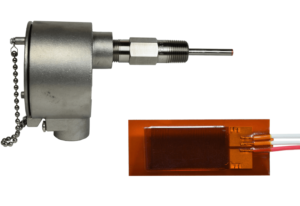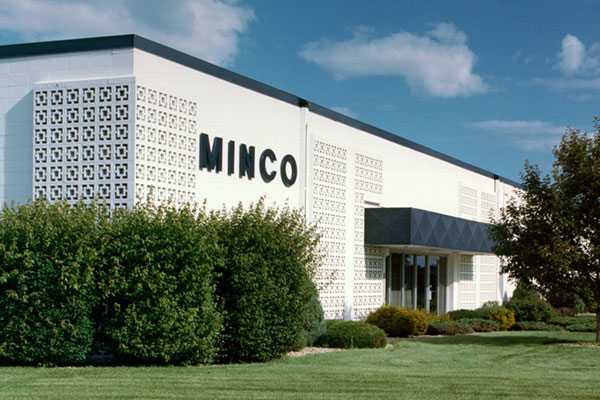TEMPERATURE
SENSORS
Minco’s 60+ years of temperature sensor expertise means we’ve just about seen it all! We offer a wide range of standard parts for fast delivery in addition to engineered custom parts for any application. Our temperature sensors deliver reliable, accurate, repeatable and cost-effective temperature measurement across a wide variety of highly specialized uses in a variety of markets including medical, aerospace, power generation, industrial, commercial and more – establishing Minco as a premier temperature sensor manufacturer.
Furthermore, Minco takes pride in its state-of-the-art manufacturing capabilities, leveraging cutting-edge technology and a commitment to quality to meet the diverse needs of our customers. Our modern facilities are equipped with advanced machinery and adhere to stringent quality control standards, ensuring precision and consistency in every product we manufacture. Whether it is high volume production of standard components or the intricate fabrication of custom solutions, Minco’s manufacturing prowess allow us to deliver exceptional temperature sensing solutions.
With a focus on innovation and adaptability, we continuously invest in our manufacturing processes to stay at the forefront of technological advancements, reinforcing Minco’s position as a trusted leader in temperature sensing solutions for over six decades.

TEMPERATURE SENSOR RESOURCES
- Minco Temperature Sensor and Instrument Product Guide - Learn More
- Choosing the Right Temperature Sensor: RTD Sensor vs Thermocouple - Learn More
- HVAC Product Guide - Learn More
- Temperature Sensor Application Matrix: Not sure which Minco products fit your application? Read the Application Guide
- Minco Time Constant Considerations Sensors White Paper - Learn More
- MInco Blog - Monitor Temperature in Ultra Low Freezer Applications - Learn More
- Type K Thermocouple Overview - Learn More
what are temperature sensors?
Temperature is the average kinetic energy of the molecules in a substance. That is a difficult entity to measure. So instead, temperature sensors measure something that is proportional to that kinetic energy, such as the electrical characteristics of certain conductive materials. These temperature sensors play a crucial in various applications, including industrial processes, scientific research, environmental monitoring, and consumer electronics. They are essential for controlling and monitoring temperature-dependent processes.
There are several types of temperature sensors available, each with its own principles of operation, temperature range, accuracy, and suitability for specific applications. Three common types of temperature sensors are thermocouples, resistance temperature detectors (RTDs), and thermistors.
| Parameter | Thermocouples |
RTDs |
Thermistors |
| Principle | Voltage generated due to temperature difference (Seebeck effect) | Temperature-dependent electrical resistance | Temperature-dependent electrical resistance |
| Material Composition | Various metal combinations | Typically platinum (Pt), nickel (Ni), or copper (Cu) | Various semiconductor materials |
| Temperature Range | Wide range, from -200°C to 2300°C depending on the thermocouple type | -200°C to 850°C (industrial grade Pt), up to 962°C (laboratory grade Pt) | Varies from -80°C to 300°C depending on the specific thermistor type |
| Durability | Generally durable in harsh environments | May be durable in harsh environments, depending on design | May be durable in harsh environments depending on design |
| Accuracy | Fair | Good | Good to excellent over limited temperature range |
| Sensitivity | Low | Moderate | High |
| Linearity | Fair | Excellent | Poor |
| Cost | Low to high | Moderate to high | Low to moderate |
| Output | Millivolt DC | Resistance (ohms) | Resistance (ohms) |
| Application Areas | Industrial equipment and processes, automotive, aerospace, energy | Industrial equipment and processes, HVAC, automotive, aerospace, energy, pharmaceuticals | HVAC, electronics, medical, automotive, aerospace |
| Advantages | Wide temperature range, durable, high temperature measurements |
High accuracy, stable, repeatable measurements |
Small size, low cost, sensitive to small temperature changes |
| Disadvantages | Non-linear output, requires cold junction compensation | Moderate temperature range, self-heating | Non-linear, limited temperature range, self-heating |
LOOKING FOR A CUSTOMIZED TEMPERATURE SENSING SOLUTION?
Half of the sensors we produce are custom engineered designs developed for challenging applications. Our Engineers are ready to help.
INTERESTED IN A STANDARD PART?
We’re here to help you find exactly what you need.
ENGINEERED SOLUTIONS
OVERCOME ANY DESIGN CHALLENGE
Miniature Sensors
Miniature Sensors
EXPLOREProbe & Probe Assemblies
Probe & Probe Assemblies
EXPLOREStator Sensors
Stator Sensors
EXPLORESurface Sensors
Surface Sensors
EXPLOREHVAC/Building Automation Sensors
HVAC/Building Automation Sensors
EXPLOREElements
Elements
EXPLOREHumidity Sensors
Humidity Sensors
EXPLORELevel Sensors
Level Sensors
EXPLOREWHY CHOOSE MINCO?
PROVEN EXPERTISE
For more than 60 years, Minco has helped engineering teams design and build the mission critical devices that power high reliability industries. We know what it takes to get the job done — on time and on budget.
INTEGRATION ACROSS PRODUCT LINES
No matter the challenge, Minco engineers bring best practices from hundreds of similar engagements worldwide to help our customers plan, design and integrate the best solutions for their programs.
MINCO CERTIFICATIONS
Various sensor models have agency approvals from ATEX, IECEx, FM, CSA, UL and more.
See the specific product page for more details.
LET'S TALK E2E
Ready to take the next step and explore powerful design innovation? Minco engineers are ready. Our thermal, flex circuit and sensing experts can help your team find a better way — minimizing costs, while improving overall system performance.
AEROSPACE
APPLICATION
Working on an aerospace application for temperature sensors? We have 60+ years of experience and a
brochure to walk you
through our capabilities.
PROTECTING
LEAD WIRES
Get tips on how to order sensors with appropriate leads to protect against physical and electrical threats.
MATCH
CALIBRATION
More accurate temperature control is critical to many industrial applications. Learn how it works in our whitepaper.
